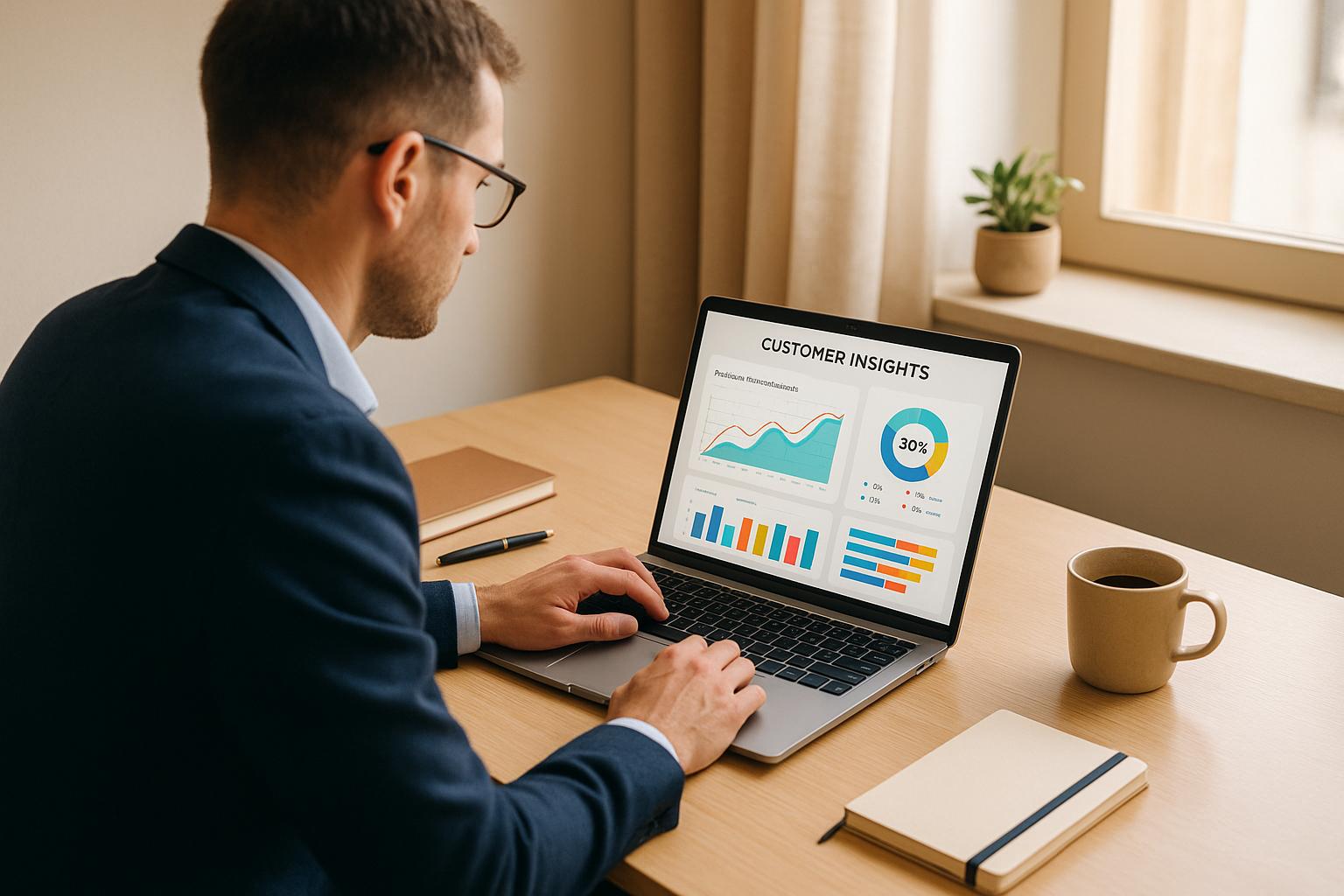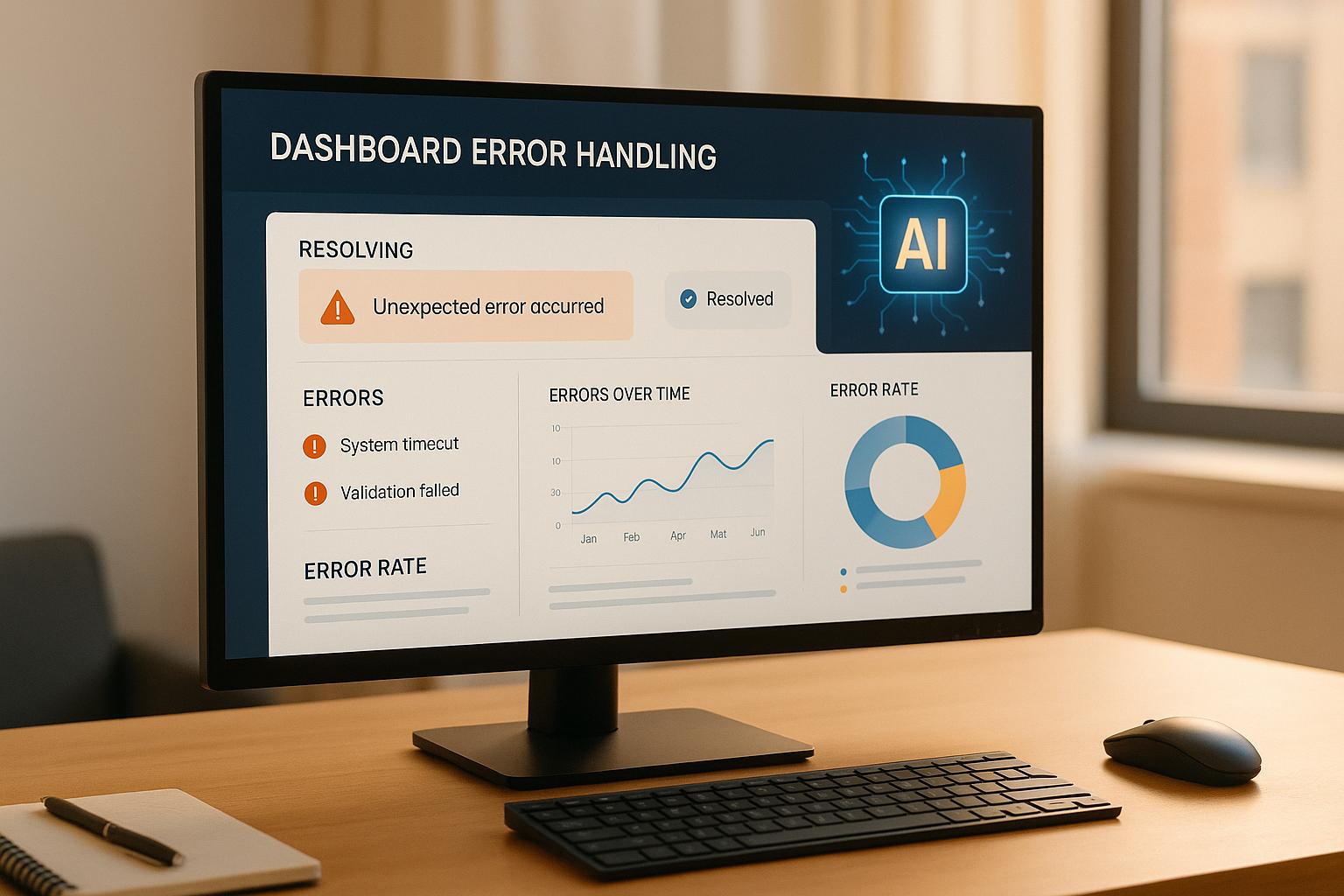AI tools are reshaping how businesses analyze competitor reputations. These tools automate data collection, analyze customer sentiment, and offer real-time insights across platforms like social media, review sites, and news outlets. Here's what you need to know:
- What is it? Competitor reputation benchmarking compares your brand's reputation metrics (e.g., customer sentiment, media mentions, social engagement) to competitors.
- How does AI help? AI speeds up analysis, provides actionable insights, and monitors trends in real time, making it easier to track competitors' performance and customer perceptions.
- Challenges: Crises can complicate benchmarking, but AI tools excel at providing real-time, accurate data while staying compliant with privacy laws.
- Key metrics to monitor: Customer sentiment, media mentions, social media metrics (engagement, share of voice), and cross-platform data.
- Top tools: Kompyte, Crayon, Contify, SEMRush, and SimilarWeb each offer unique features like real-time tracking, sentiment analysis, and global reach.
AI tools are essential for staying competitive, especially in fast-changing markets or during competitor crises. By tracking key metrics and leveraging AI insights, businesses can make smarter decisions and refine their strategies effectively.
Birdeye Competitors AI | AI-Powered Competitive Intelligence Software
Key Metrics for Competitor Reputation Analysis
Tackling reputation challenges effectively requires a focus on the right metrics. These key performance indicators (KPIs) are essential for understanding and evaluating competitor reputation.
Important KPIs to Monitor
To benchmark against competitors effectively, you need to track metrics that truly matter. One of the most revealing is customer sentiment, which highlights how people feel about a brand. Platforms like Google and Yelp provide review scores that quantify customer satisfaction and reveal emerging trends. Similarly, media mentions track how often competitors appear in news stories, blogs, and industry publications. On the digital front, social media activity metrics - such as engagement rates, follower growth, share of voice, and response times - offer a window into how competitors manage their online presence. These insights are especially valuable during crises when reputational shifts can occur rapidly.
For example, between June and August 2024, Brand24 analyzed Adidas and uncovered a spike in mentions tied to viral TikTok content promoting the European Football Championship. Using the platform's Anomaly Detector, the analysis pinpointed this event-driven surge, showcasing how well-executed campaigns can dominate public attention. This highlights the importance of monitoring mention volume and identifying anomalies to uncover successful competitor strategies.
Cross-Platform Data Collection
Reputation analysis requires gathering data from a variety of platforms where customers engage with brands. Google Reviews and local listings provide insights into location-specific reputation, while platforms like Facebook and Instagram reveal social engagement trends and community sentiment. For B2B companies, LinkedIn is particularly useful for understanding professional reputation, while Twitter captures real-time conversations and reactions. Industry-specific platforms, such as Glassdoor, add another layer by offering insights into employer reputation and sector-specific reviews.
To make sense of this vast data, advanced tools are indispensable. For instance, Similarweb processes over 10 billion digital signals daily, while Crayon monitors more than seven million sources .
Brand24’s competitive analysis of Nike and Adidas during the same June–August 2024 period offers another insightful example. While Nike had twice as many social media mentions, Adidas achieved an almost identical social reach. The reason? Adidas was mentioned by high-profile influencers like Real Madrid and Kanye West, showcasing the power of strategic partnerships despite lower overall mention volume.
How AI Tools Make Analysis Easier
AI simplifies the complex task of reputation analysis by automating data collection across multiple platforms. What once took days or weeks can now be achieved in mere hours. These tools excel at spotting patterns, identifying trends, and recognizing seasonal shifts that might otherwise go unnoticed. They can simultaneously analyze pricing strategies, content performance, social media activity, and customer sentiment, offering a comprehensive view of competitor positioning.
Simon Bacher, CEO and co-founder of Ling, highlights the value of AI tools:
"Sprout Social allows us to monitor brand mentions, hashtags, keywords, and more across various platforms. It helps us gain insight into how consumers perceive our and competitors' brands."
AI tools also provide real-time monitoring, sending alerts when significant changes occur in a competitor’s reputation. This allows businesses to act quickly, whether to seize an opportunity or mitigate a threat. By comparing target audiences and identifying shared demographics and interests, these tools uncover market overlaps and help businesses refine their positioning. With their ability to transform raw data into actionable insights, AI tools have become essential for modern reputation analysis, enabling brands to stay ahead in a competitive landscape.
Top AI Tools for Competitor Reputation Benchmarking
AI-powered tools for monitoring competitor reputation have come a long way, offering businesses smarter ways to stay ahead in competitive markets. With 90% of Fortune 500 companies leveraging competitive intelligence to maintain their edge, choosing the right AI tool has become more important than ever.
Overview of Leading Tools
Several standout platforms are leading the charge in competitor reputation benchmarking, each offering unique advantages.
Kompyte is a top choice for real-time website monitoring. Its AI-driven features automatically update battle cards and provide daily summaries, ensuring businesses stay informed. It’s also known for its quick setup and flexibility to adapt to changes in competitor tracking.
Crayon, a seasoned player in the market, excels in distributing automated competitor insights and centralizing sales battle cards. However, while its data collection is robust, users may need to invest time in filtering data for actionable insights, and scalability can pose challenges.
Contify shines with its global reach, offering competitive intelligence across over 100 languages. Its focus on global news feeds and custom newsletters makes it an excellent choice for companies operating internationally.
SEMRush, renowned for its SEO capabilities, also delivers powerful tools for competitor analysis. It combines domain analytics, keyword research, and social media tracking, offering insights into content performance and social sentiment.
For businesses seeking a broader view of the market, SimilarWeb provides insights into website performance, audience analysis, and industry benchmarks.
Each of these tools caters to different needs, so the right choice depends on what a business prioritizes - be it real-time updates, global coverage, or comprehensive online analysis.
Key Features of Each Tool
Here’s a closer look at what makes each tool stand out:
- Kompyte: Offers advanced AI for data collection and filtering, along with real-time monitoring. Its reliable support and adaptability make it a strong contender for businesses needing constant updates.
- Crayon: Known for its established presence, it provides unlimited user access and robust data collection. However, users may need to filter through the data to extract actionable insights.
- Contify: Features a user-friendly interface with structured taxonomy for competitive intelligence. Its SmartTranslate and sourcing manager tools add customization, though there’s a learning curve involved.
- SEMRush and SimilarWeb: Both platforms provide comprehensive analyses, with pricing starting at $129.95/month and $125/month, respectively. However, they can face challenges with reliability and regional consistency.
The decision between these tools often boils down to a business’s specific needs and budget. While all-in-one platforms integrate market intelligence into daily operations, specialized tools dive deeper into specific areas of analysis.
For businesses looking to refine their competitive strategies, AI tools curated on AI for Businesses offer tailored solutions for SMEs and scaling companies.
sbb-itb-bec6a7e
Comparing AI Tools for Reputation Benchmarking
Picking the right AI tool for managing your brand's reputation means weighing features, costs, and how well the tool fits your business needs. Below, we'll break down key features and advantages to help guide your decision.
Feature and Benefit Comparison
When comparing tools, focus on essential features like real-time tracking, sentiment analysis, crisis alerts, customizable dashboards, and integration options. Each of these features plays a role in effective reputation management. For instance:
- Brand24 stands out for its ability to monitor multiple platforms, including social media, news outlets, blogs, and forums.
- BrandBastion specializes in social media reputation management, using AI to moderate comments and safeguard your brand image on platforms like Instagram, Facebook, and YouTube.
- SalesGroup.ai offers a unified dashboard designed to track mentions across email, chat, social media, and review sites.
These tools also integrate seamlessly with customer relationship management (CRM) software, social media management platforms, content management systems, and marketing analytics tools, offering a well-rounded approach to reputation monitoring.
Choosing the Right Tool for Your Business
Once you've reviewed the features, it's important to choose a tool that matches your business size, budget, and monitoring goals. Many AI tools use natural language processing (NLP) to analyze the tone of mentions - whether they're positive, negative, or neutral.
For small to medium-sized businesses, tools like Brand24 or Mention provide essential features without unnecessary complexity, making them excellent choices for straightforward reputation monitoring. On the other hand, larger enterprises often need more advanced solutions capable of handling higher data volumes and offering deeper customization options.
Here's an example: A mid-market agency adopted an AI-powered reputation management platform and shifted from hourly billing to a tiered subscription model. The change boosted their profit margins by 35%, reduced client churn by 28%, and increased the average client value by 42%.
When selecting a tool, consider pricing models that directly link costs to measurable outcomes - like more positive reviews or faster responses to negative feedback. Also, don't overlook the total cost of ownership, which includes setup fees, training, and ongoing management.
Michael Roberts, founder of a digital marketing agency, shared his experience:
"When we first integrated AI into our reputation management services, we saw our margins temporarily decrease. But within six months, we were able to handle three times the client load with the same team size. Our profit per client increased by over 40%."
To get the most out of these tools, adjust the AI settings to reflect your brand's tone and specific needs. Many businesses find success by combining multiple tools to create a more comprehensive monitoring strategy, leveraging each tool's strengths. These features are particularly useful for managing crises and maintaining your brand's reputation, which ties into the broader competitive intelligence strategies discussed earlier.
For businesses aiming to improve their competitive edge, platforms like AI for Businesses curate a selection of AI tools tailored for small and medium enterprises (SMEs) and scaling companies, simplifying the process of finding the right fit.
Using AI Tools During and After Competitor Crises
Competitor crises can open the door to gaining market share if handled strategically. AI tools play a key role in real-time monitoring and crafting informed responses, all while maintaining ethical practices.
Step-by-Step Guide to Crisis Monitoring
Set up comprehensive monitoring by configuring AI tools to track competitor mentions across various digital platforms. Tailor keyword settings, platforms, and sentiment thresholds to receive real-time alerts when there’s a significant dip in sentiment or a surge in mention volume .
For instance, a logistics company utilized AI monitoring to categorize customer feedback, addressing concerns more effectively. This approach reduced negative feedback by 40% and increased customer retention by 25%.
Track sentiment shifts by using natural language processing (NLP) to analyze context, sarcasm, and tone, even across multiple languages. This provides clarity on whether a competitor’s crisis is worsening or nearing resolution.
"In the era of complete digitization, monitoring the media in real time and quick reaction are the basics of our work, especially in crisis communication. Thanks to Determ, which scans our digital media space 24/7, we are informed about all important events right away, with notifications on the screen of our smartphones."
- Kresimir Macan, CEO at Manjgura, PR agency
These steps establish the foundation for adjusting strategies as competitor crises evolve.
Adjusting Strategies with AI Insights
Pinpoint competitor vulnerabilities by analyzing real-time data. Look for recurring customer complaints, service gaps, or messaging missteps that your business can address more effectively.
Create strategic responses by leveraging AI insights to craft timely, relevant messaging. However, ensure human oversight to align these responses with your brand values.
A great example comes from Wendy’s. When a radio station posted on X about McDonald’s changing their burgers, Wendy’s responded by referencing past accusations about McDonald’s patties not being real meat. This clever move showcased how monitoring competitor mentions can lead to sharp, strategic positioning.
Evaluate sentiment changes to monitor the resolution of a competitor’s crisis and prioritize your responses accordingly.
With 93% of buyers saying online reviews influence their purchasing decisions, staying proactive during competitor crises can significantly sway customer preferences. Once the immediate crisis response is handled, ongoing monitoring is essential for maintaining your reputation.
Best Practices for Continuous Monitoring
Keep reputation monitoring active by integrating multiple channels and setting up real-time sentiment tracking. Use customizable dashboards to stay on top of trends . Incorporating sentiment metrics into your KPIs provides a more complete picture of your brand’s standing.
The Atlanta Hawks offer a strong example of this. During the launch of their Martin Luther King Jr. Nike City Edition jersey, they implemented real-time sentiment analysis to track keywords and hashtags. The campaign achieved a 99% positive sentiment rating.
"A lot of internal stakeholders love seeing the Topic Insights Word Cloud and Sentiment Summary. When we launched the Martin Luther King Jr. Nike City Edition jersey earlier last season, it was met with 99% positive sentiment."
- Katie DuPre, the Hawks' social strategy manager
Build an AI-ready framework that equips your marketing teams to seamlessly integrate AI tools into crisis management workflows. This framework should include clear protocols for escalation, response timing, and team communication.
Choose tools that excel in data collection, NLP capabilities, and intuitive reporting. Platforms like AI for Businesses provide curated solutions to help small and mid-sized enterprises monitor and respond effectively during competitor crises.
Conclusion: Using AI for Competitive Advantage
AI-driven reputation benchmarking is changing how businesses monitor competitors and protect their market position. With 73% of companies expected to use AI for customer experience management by 2025 and the AI market projected to grow from $214 billion in 2024 to $1.339 trillion by 2030, the shift toward AI adoption is undeniable.
The real advantage lies in AI's ability to predict sentiment changes and identify potential crises before they escalate. This proactive approach gives businesses real-time insights into emerging risks, enabling them to act swiftly and avoid reputation pitfalls.
"AI has transformed reputation management from a static, request-response process to a proactive, interactive, automated, and predictive one." - Carter Rees, PhD, In-house Expert on Artificial Intelligence, Reputation.com
AI doesn't just enhance risk management - it also boosts productivity by up to 40%, allowing teams to focus on more strategic, high-value tasks .
Looking ahead, AI is evolving into a decision-making ally, offering real-time tools to shape and protect reputations. The integration of generative AI in search results, advanced predictive analytics, and automated workflows is already underway. Additionally, incorporating external data sources - like weather patterns and demographic trends - will provide businesses with even deeper insights for managing their reputation.
"Companies already invested in reputation strategies will gain access to better data, richer insights, and predictive capabilities that will propel their brands forward." - Carter Rees, PhD, In-house Expert on Artificial Intelligence, Reputation.com
To stay competitive, businesses need to embrace AI now. Those already leveraging AI-powered tools for real-time monitoring and crisis management are positioned to benefit the most from future advancements. Companies that adopt AI will not only safeguard their credibility but also build lasting customer trust. By combining the right metrics, monitoring strategies, and tools, businesses can secure a decisive edge in their industries.
For small and medium-sized enterprises, platforms like AI for Businesses provide accessible and cost-effective ways to adopt these advanced tools. The future will favor organizations that don’t just monitor their reputation but actively shape it, using AI to thrive in an increasingly competitive landscape.
FAQs
How can AI tools help my business stay ahead when competitors face a crisis?
AI tools can give your business an edge during a competitor's crisis by offering real-time insights into market trends and public sentiment. These tools sift through massive amounts of data - from social media chatter to news reports - helping you spot changes in competitor reputation or shifts in customer preferences almost instantly.
With this information, you can adjust your strategies, make smarter decisions, and capitalize on opportunities to solidify your position in the market. Plus, AI tools allow for continuous monitoring, keeping you ahead of the curve when things are unpredictable.
What should I look for in an AI tool to analyze competitor reputation effectively?
When picking an AI tool for competitor reputation benchmarking, it's important to look for features that provide accurate, actionable insights. Prioritize tools that offer real-time monitoring, sentiment analysis, and automated data collection to keep your information timely and relevant.
You’ll also want to evaluate the tool’s user-friendliness, its ability to scale with your data needs, and how well it can integrate with your current systems. Don’t overlook security and affordability, and aim for a provider with a proven track record and dependable support. Keeping these factors in mind will help you make smarter decisions, especially in challenging situations.
How do AI tools help businesses comply with privacy laws when analyzing data from multiple platforms?
AI tools play a crucial role in helping businesses meet privacy law requirements by automating essential tasks. These include managing user consent, processing data access requests, and creating compliance reports. Such capabilities make it easier for companies to align with regulations like the GDPR and CCPA.
Many of these tools also come equipped with frameworks to evaluate privacy risks, track data usage, and promote transparency. By doing so, they minimize the chances of unauthorized data collection or misuse, helping businesses maintain customer trust and steer clear of legal troubles.


